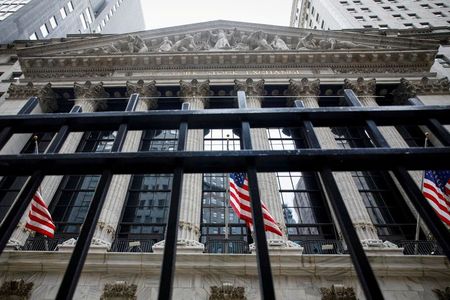By Caroline Valetkevitch
NEW YORK (Reuters) – Wall Street stocks fell on Tuesday, with technology shares turning lower in late New York trading, while the U.S. dollar touched its lowest level since late February.
The Nasdaq also reversed course to end the day lower, while the Dow and S&P 500 added to declines late in the session. The S&P 500 technology index was the biggest drag on the benchmark S&P 500.
Investors were anxious ahead of Wednesday’s release of minutes from the Federal Reserve’s April policy meeting. Rising inflationary pressure in the United States has been increasing investor speculation the Fed could possibly raise interest rates sooner than anticipated.
While few market-watchers expect big surprises from the minutes, “the market is bracing for a transition,” said Quincy Krosby, chief market strategist at Prudential Financial in Newark, New Jersey. “So there’s a little bit of de-risking going on.”
Fed Vice-Chair Richard Clarida on Monday pointed to the weak April jobs report as proof of lingering weakness in the economy.
Telecommunications shares lost ground, while retailers mostly gained. Walmart Inc, the world’s biggest retailer, raised its full-year earnings forecast. AT&T Inc added to declines from Monday, when it said it would cut its dividend payout ratio.
Concern over the Israel-Palestinian conflict added to investor unease, Krosby said.
World powers including the United States urged a truce in the conflict as Israel bombarded Gaza with air strikes and Palestinian militants resumed cross-border rocket fire on Tuesday.
On Wall Street, the Dow Jones Industrial Average fell 267.13 points, or 0.78%, to 34,060.66, the S&P 500 lost 35.46 points, or 0.85%, to 4,127.83 and the Nasdaq Composite dropped 75.41 points, or 0.56%, to 13,303.64.
The pan-European STOXX 600 index rose 0.17% and MSCI’s gauge of stocks across the globe gained 0.04%.
Still, the dollar dipped for the fourth straight session on waning fears over the Fed’s outlook. The progress of COVID-19 vaccine deployment and easing of measures to contain the pandemic have lifted higher-risk currencies that stand to benefit most from economic revival.
The dollar index fell 0.437%, with the euro up 0.02% to $1.2222.
Bitcoin dipped 1.9% to a more than three-month low, extending its slide after Tesla Inc boss Elon Musk dampened enthusiasm for the cryptocurrency over the weekend.
Nominal U.S. Treasury yields remained little changed, with the yield on 10-year Treasury notes up 0.9 basis point at 1.649%, below a spike above 1.75% reached in late March.
Investors are awaiting the release of the Fed minutes, but nothing significant is expected, said Guy LeBas, chief fixed income strategist at Janney Montgomery Scott.
“It’s unlikely that we’re going to get material changes out of the FOMC minutes,” he said.
Oil prices settled lower. Media reports said the United States and Iran have made progress on reviving a deal restricting the OPEC country’s nuclear weapons development, which would boost crude supply.
Brent crude fell 1.1% to settle at $68.71, while U.S. West Texas Intermediate crude dropped 1.2% to $65.49.
U.S. gold futures gained 0.03% to $1,867.80 an ounce.
(Reporting by Caroline Valetkevitch in New York; Additional reporting by Danilo Masoni in Milan and Stephen Culp, Laura Sanicola and Herbert Lash in New York; Editing by Dan Grebler and Matthew Lewis)





